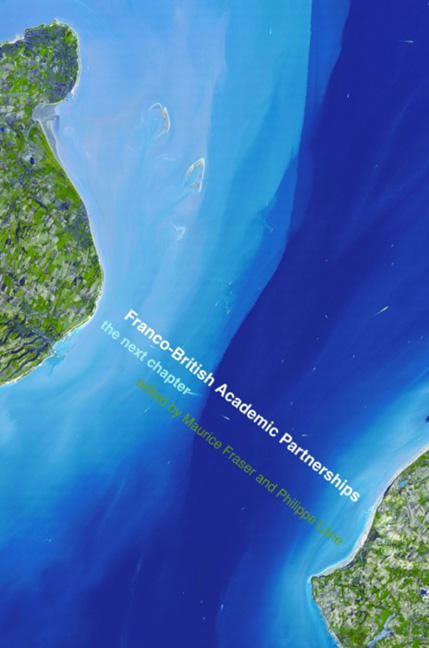Book contents
- Frontmatter
- Contents
- Notes on Contributors
- Foreword by His Excellency
- Foreword
- Preface
- Part I: Teaching and Training Partnerships
- 1 Why is the United Kingdom Important to Sciences Po?
- 2 Franco-Welsh Academic Partnerships: A Case Study Involving Transnational and Cross-sector Mobility
- 3 Double Diplomas: A Franco-British Training Route of Excellence for Teachers of French Worldwide?
- 4 The Entente Cordiale: A Grande École Engineering School Perspective
- 5 Links Between British Universities and French Instituts Universitaires de Technologie: New Forms of Collaboration
- 6 One Model: The Franco-German University
- 7 Raising Students’ International Profile: How Do Universities Address This Issue in Europe?
- 8 Franco-British Academic Partnerships at the University of Provence
- 9 University College London and France: Teaching and Research Collaborations
- 10 Université Paris 1 Panthéon-Sorbonne: An Overview of More Than 30 Years of Franco-British Partnerships
- 11 Towards a Vision for a Networked European Business School
- Part II: Research Partnerships
- Part III: Broader Perspectives
- Appendices: Addresses and Speeches at the Franco-British Academic Partnerships Seminar, French Institute, London, 5 February 2010
2 - Franco-Welsh Academic Partnerships: A Case Study Involving Transnational and Cross-sector Mobility
from Part I: Teaching and Training Partnerships
- Frontmatter
- Contents
- Notes on Contributors
- Foreword by His Excellency
- Foreword
- Preface
- Part I: Teaching and Training Partnerships
- 1 Why is the United Kingdom Important to Sciences Po?
- 2 Franco-Welsh Academic Partnerships: A Case Study Involving Transnational and Cross-sector Mobility
- 3 Double Diplomas: A Franco-British Training Route of Excellence for Teachers of French Worldwide?
- 4 The Entente Cordiale: A Grande École Engineering School Perspective
- 5 Links Between British Universities and French Instituts Universitaires de Technologie: New Forms of Collaboration
- 6 One Model: The Franco-German University
- 7 Raising Students’ International Profile: How Do Universities Address This Issue in Europe?
- 8 Franco-British Academic Partnerships at the University of Provence
- 9 University College London and France: Teaching and Research Collaborations
- 10 Université Paris 1 Panthéon-Sorbonne: An Overview of More Than 30 Years of Franco-British Partnerships
- 11 Towards a Vision for a Networked European Business School
- Part II: Research Partnerships
- Part III: Broader Perspectives
- Appendices: Addresses and Speeches at the Franco-British Academic Partnerships Seminar, French Institute, London, 5 February 2010
Summary
Background
Many leading academics and employers argue that students who participate in academic mobility placements enhance their employability. Indeed, the European Commission's 2009 Green Paper Promoting the Learning Mobility of Young People opens with the following statement:
learning mobility, i.e. transnational mobility for the purpose of acquiring new skills, is one of the fundamental ways in which individuals, particularly young people, can strengthen their future employability as well as their personal development.
A report published in November 2009 by the Higher Education Funding Council for England (HEFCE) also found that Erasmus students have a better profile of degree results than other students, 75 per cent of them receiving either a first or an upper second honours degree, compared with 60 per cent of students from four-year courses. Traditionally in the UK, such placement opportunities have been restricted to undergraduate (‘cycle 1’) students, whose study periods are based at partner universities or educational establishments.
This chapter highlights an ambitious and exciting project involving universities in Wales and the Versailles region, along with two chambers of commerce – one based in Versailles and the other in South Wales. Its unusual characteristic is that it places emphasis on industrial-based mobility placements for students and professional development courses for young employees – of both a transnational and a cross-sector nature. The project was conceived at a seminar organised by Welsh Higher Education Brussels (WHEB), in November 2009. At the seminar, colleagues from a number of countries were invited to consider means of developing innovative mobility opportunities in line with the ambitions of the European Commission, as articulated in the above-mentioned Green Paper and in its communication on employment of June 2009. The communication highlights mobility as a key priority in the development of a knowledge-based economy and society – essential in facing current economic challenges. Furthermore, the ministers of Europe with responsibility for higher education have set a target: by 2020, 20 per cent of students graduating in the European Higher Education Area should have benefited from a transnational mobility experience. At the Brussels seminar it was stressed that the higher education sector will need to be ambitious in its plans if it is to meet this target.
- Type
- Chapter
- Information
- Franco-British Academic PartnershipsThe Next Chapter, pp. 14 - 24Publisher: Liverpool University PressPrint publication year: 2011

